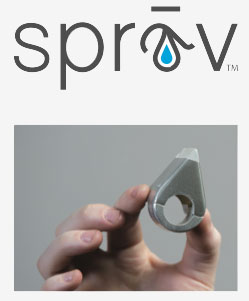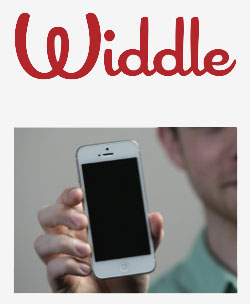feature
Consuming Passions
by Rebecca Meiser
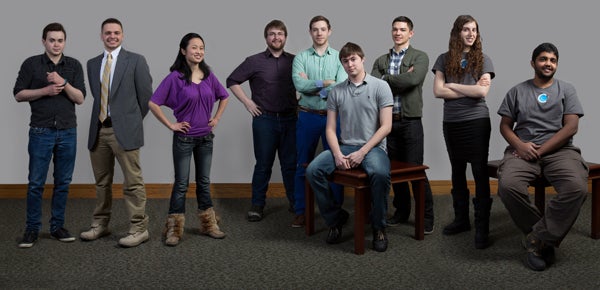 photo: Annie O'Neill
photo: Annie O'Neill
Chris Wentz was an elementary school student in Boulder, Colo., when he opened his first business: a frozen orange-drink stand. "There were already lemonade suppliers on my block," he explains. "I needed to differentiate my brand."
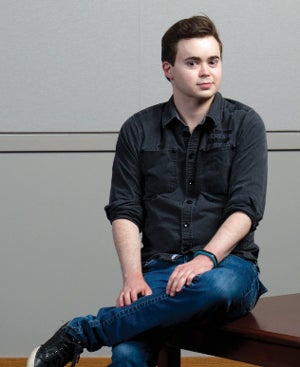 photo: Annie O'Neill
Chris Wentz
photo: Annie O'Neill
Chris Wentz
This is the way Wentz (CWR '13) thinks.
Like an old-world explorer, the 23-year-old has a keen ability to survey a map and understand what ground has been covered, and what hasn't. He's now on his fifth—and potentially biggest—business venture. "I'm good at seeing unmet market needs," Wentz says with a shrug.
In fall 2012, he took an entrepreneurship class where the professor challenged students to create a business concept.
Wentz, then a senior computer science major, began to think about everyday problems. One that really annoyed him was the number of passwords and keys he had to store in his head and backpack.
Wouldn't it be cool, he thought, if one master key could unlock everything— from your dorm room to your phone to your computer?
His group proposed putting such technology on a wearable, wireless-enabled wristband that could be disabled quickly if it was lost or stolen.
Today, EveryKey is a limited liability company with Wentz as its CEO. Its 25-member team includes partners who were classmates of Wentz, as well as contractors and student interns. Last summer, the company received $25,000 to develop its product from the Innovation Fund, an initiative of the Lorain County Community College Foundation, which receives financial support from Ohio's Third Frontier Commission.
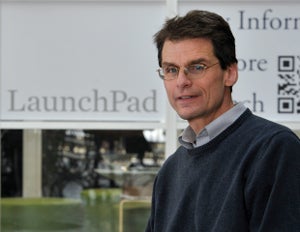 photo: Roadell Hickman
Bob Sopko
photo: Roadell Hickman
Bob Sopko
Around that time, Bob Sopko, director of Case Western Reserve's entrepreneurship incubator Blackstone LaunchPad, reached out to Wentz. Sopko had worked with him since EveryKey was a classroom project. Now he had an enticing offer. For the first time, the International CES (formerly known as the Consumer Electronics Show) would provide a separate exhibition section for college and university students. The show is the Super Bowl of the tech expo industry, and LaunchPad planned to purchase a booth.
Would Wentz, who had remained on campus to earn a master's degree, like to participate?
"Yes!" he said instantly. "For people in the electronics field, the Consumer Electronics Show is the holy grail," he explains. "If you want to make it big, that's where you go." Founders of the other student companies invited to attend the show also appreciated its importance. For them, the next several months would be a blur of deadlines, frustrations and joys as they prepared for CES—and learned the day-to day realities of balancing life as students and entrepreneurs.
Cultivating ENTREPRENEURS
Case Western Reserve claims a long history of entrepreneurial graduates. The inventors of Gmail, Nike Air Sole and craigslist all are alumni, as is the lead engineer of the Pebble, a best-selling smart watch, and the founders of ONOSYS, a restaurant online ordering company now part of LivingSocial.
In spring 2013, the university opened Blackstone LaunchPad. Funded by The Blackstone Charitable Foundation and the Burton D. Morgan Foundation, it offers mentorship, networking and guidance for students and alumni who hope to start businesses. Over the past year, Blackstone LaunchPad has helped more than 180 people navigate the startup process.
It has a strong partner in think[box], the engineering school's innovation lab. Equipped with everything from 3-D printers to soldering irons, think[box] allows students, as well as members of the general community, to create and modify prototypes of new products—or simply explore potential ideas.
Once CES announced the opportunity for student exhibitors, Blackstone LaunchPad moved quickly to engage potential participants.
"The event is the most heavily attended showcase for the tech industry," says Joseph Jankowski, the university's chief innovation officer. "We wanted to show the attendees and the global media that cover the event all the amazing things students from the university are doing." The CES organizers already knew of Case Western Reserve. "In doing research, we noted that the school had the types of programs in place that boost innovation within a college/university setting," says Allie Fried, senior manager of international communications at the Consumer Electronics Association, which owns and produces the International CES. "The entrepreneurial program is what caught our eye and impressed us."
Along with EveryKey, the exhibiting companies from CWRU were: EcoSpinners, an emission-free, fuel-cell-powered electric bike company; Widdle, which created an app to filter social media posts; Kudoala, a social network from the Widdle founders to give people public kudos; Sprav Water, whose wireless meter allows users to track their shower's water and energy consumption; Disease Diagnostic Group, which has been developing a portable, hand-held malaria-detection device; and Carbon Origins, which designs, manufactures, tests and launches reusable rockets to perform experiments in the higher atmosphere.
But before they could even think about Vegas, the teams needed to refine their products.
juggling school and work
In fall 2013, Wentz realized he could not simultaneously apply for patents, finalize EveryKey's design, prepare for CES and complete his graduate coursework.
He enrolled in the university's Career Center Practicum Program—an option that allows people such as Wentz to maintain student status while doing real-life projects and internships. With the extra time, Wentz could work day and night on EveryKey's development and even travel to China to tour manufacturing and industrial-design plants. Wentz's partners—Chief Financial Officer CiCi Qian (CWR '14), an original member of the EveryKey team, and Alex Chen, Wentz's roommate and EveryKey's marketing director —still were full-time students and filled in where they could.
The founders of Carbon Origins dealt with similar pressures. In the beginning, they hoped to accessorize their rocket prototype with a complex radio communications system. But after a few weeks of sleepless nights and incomplete homework assignments, they ditched those plans. "We were running out of time," says CEO Amogha Srirangarajan, a junior studying aerospace, mechanical and computer engineering. "We estimated that it would take another 1,000 man hours of work to work out all the kinks."
Other student entrepreneurs faced a different kind of juggling act.
Matt Strayer, a junior and co-founder of Widdle and Kudoala, couldn't take off a semester to prepare for CES. Instead, he squeezed in meetings with software developers between classes and papers.
Strayer and partner A.J. Mihalic (who has attended The University of Tampa) moved forward on development deadlines, even as they dealt with a range of startup issues and regularly met with people at least a decade older.
"It's sometimes hard to be taken seriously when you are the youngest person in the room," says Strayer.
As CES grew near, Wentz felt he was on track to have a fully functioning prototype of the EveryKey wristband. His trip to China yielded valuable contacts. And the bright blue and black, bendable, silver-tipped wristbands Chen designed—and a Chinese manufacturing company produced—far exceeded his hopes.
One month before the show, Wentz received an email from a major electronics company official, who also is a Case Western Reserve alum. He wanted to meet with Wentz at the show. Wentz was elated. But then disaster struck.
The Case School of Engineering's electrical engineering and computer science department requires students to complete a senior capstone project. For theirs, Wentz and a team of fellow computer science majors received permission in spring 2013 to work on EveryKey software coding that would unlock Android devices and computers running Windows. The system was successful, and Wentz did not think anything more about it.
But in December—just weeks before the show—while uploading the code onto a newer Android phone, EveryKey engineer Mike Xu, a fifth-year senior in computer science, found the code no longer worked.
It turned out Wentz and his classmates/developers programmed on a now-outdated version of Android. Usually, new updates are compatible with older software, but not this time. Wentz and his team were shocked.
They worked to find a solution, but soon realized they wouldn't have one before the show. With weeks to go, they switched tactics: Instead of highlighting EveryKey's current technology at the electronics show, they instead would focus on its usability, design and potential.
"It was disappointing," Wentz says.
But with zero time left, he headed to the show and hoped for the best.
SHOWTIME
The International CES takes place every January in Las Vegas. This year it drew more than 3,500 exhibitors and 150,000 visitors.
With seven student companies exhibiting, Sopko had purchased a second booth. But by then, so many vendors had purchased booths that the second one was outside the academic area.
That's how Jean Zhao of EcoSpinners and Wentz ended up near well-known companies such as Hammermill Papers.
"They had their own audio systems and high-tech videos," Zhao says. Meanwhile, Zhao and Wentz had decorated the booth with tables and chairs they'd bought from Walmart.
"At the beginning of the show, the students were wondering if they could hold their own," says Sopko, who was the university's point person working with both CES and the students. "It was quickly apparent, as people lined up to talk, that they respected the students as peers and were impressed by the technology they developed."
For Zhao, the event was a big networking opportunity. She says she left the show with contacts and interest from dozens of executives and bicycle enthusiasts who wanted to be updated on EcoSpinners' progress.
For Wentz, the highlight was to be the meeting with the electronics company senior official. He arrived at the presentation with Sopko, Chen, Xu and Hope Ho, a first-year finance student.
Acting more confident than he felt, Wentz told the official EveryKey was well on its way to having a workable system, compatible with Android devices, that, when accessed, could unlock everything from Gmail to a car door. Then he handed him a prototype of the bracelet.
The company official could not be reached for comment, but Wentz and Sopko say he was encouraging.
Wentz ended the meeting with a pledge to keep in touch as EveryKey's technology evolved.
MOVING AHEAD
CES did not prove to be the apex of the student entrepreneurs' journey, but instead another milestone in their long climb to market (see next page for company updates).
Wentz and his team are eager to start production. One night in February, he stood in the office at Blackstone LaunchPad in front of a large white board covered with dozens of yellow, pink, blue and green sticky notes that identified high-priority tasks ("update website") and smaller details ("get better permanent markers") that still needed attention.
In March, his team fixed its previous coding issues, developing a solution that allows the wristband to work with the latest version of Android phones or tablets. The team also is working to make the wristband compatible with Apple devices. In the next few months, Wentz hopes to raise $100,000 via the online fundraising platform Kickstarter to place a 2,000-item order with his manufacturing representative in China. The Kickstarter price of $50 per wristband likely will increase to $69 or $79 when the company broadens its sales to more online sites as well as stores, Wentz says.
"The next nine months will really tell a lot," says Dennis Cocco, co-director of the Great Lakes Innovation and Development Enterprise, a division of Lorain County Community College that administered the Innovation Fund grant to EveryKey. "You're never sure how consumers will react to anything new, but EveryKey had a good showing at the trade show, and it appears that large market players have interest in it."
For the moment, however, Wentz is elated every time he gets to rip a to-do list note off his wall. "You just get this really big sense of accomplishment from it," he laughs. "It's one less thing to do."






